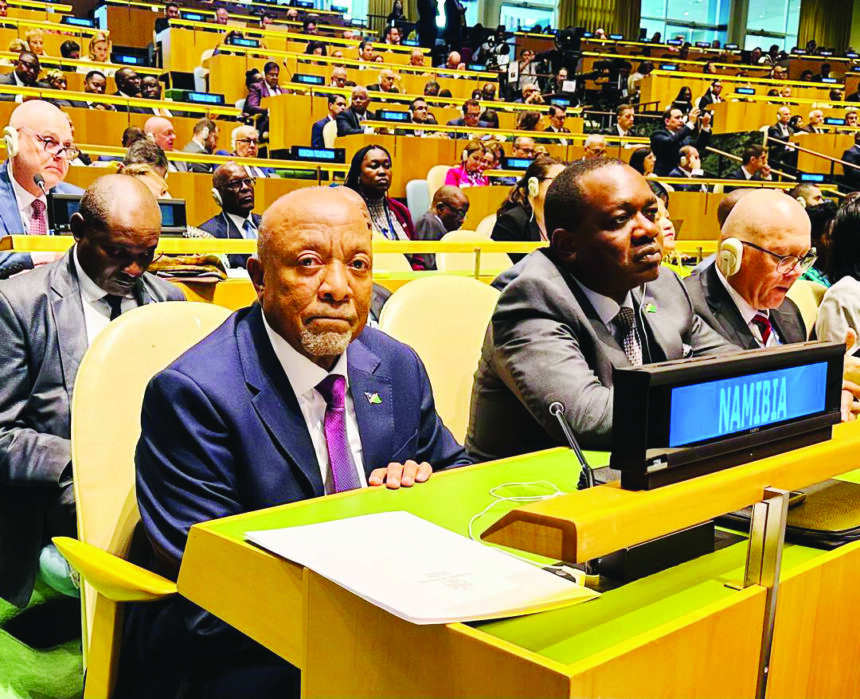President Nangolo Mbumba has called for decisive global action to tackle pressing global challenges.
He also urged world leaders to adopt a new pact for the future during his address at the opening session of the Summit of the Future at the United Nations in New York.
In the speech before global dignitaries, including UN Secretary General António Guterres and German chancellor Olaf Scholz, the President outlined the dire state in which the world finds itself.
“Today, the world is at a crossroads. One path leads to environmental catastrophe, widening inequalities, global conflict and destruction, while the other offers hope,” Mbumba said.
He added that the time for action is now, emphasising that this summit is “a timely and urgent call to action”, where nations must deliberate to pursue peace, prosperity and sustainable development.
The Head of State began by highlighting the significance of the summit, which was 18 months in the making.
“This Summit of the Future is a pivotal moment in our quest to shape a brighter, more just, sustainable and peaceful common future for all humanity,” he stated.
He described the “Pact for the Future” as a collective agreement to confront global challenges head-on, including poverty, hunger, climate change and public health crises.
In his speech, the Namibian President reflected on the evolution of global governance since the United Nations was established in 1945.
“So much has changed,” he noted, comparing the post-World War II era to the current global landscape. He stressed that the modern world’s complexities demand the reform of international institutions, particularly the United Nations and its Security Council.
“To forge a brighter tomorrow for people and the planet, we must be courageous to reform international organisations,” he declared.
Mbumba laid out four key pillars for the UN’s reform agenda. Firstly, he called for economic opportunities to be driven by pathways which prioritise environmental sustainability.
Secondly, he emphasised the need to strengthen global institutions to achieve the Sustainable Development Goals.
Thirdly, the President pushed for an innovative financial architecture to finance these goals. Finally, he urged nations to harness scientific and technological advancements responsibly, cautioning against the misuse of innovations like artificial intelligence and biotechnology.
The President reiterated Namibia’s commitment to the principles of sustainable development, which he summarised through the five Ps (people, planet, prosperity, peace and partnerships).
He stressed the importance of leaving no one behind, living within planetary boundaries, and ensuring that the benefits of modern education and technology are extended to all.
The Namibian leader also emphasised the need for international peace, noting, “In the nuclear age, peace requires nations to live together under international law and the UN Charter.”
Mbumba then urged world leaders to leave the summit with “renewed commitments and concrete action plans”, reminding them that “future generations will judge us not by our words, but by our actions.”
His call for global solidarity underscored the urgency of tackling the interconnected crises facing the world today. “We have the tools, the knowledge and the opportunity to shape a better world,” he said confidently, adding that together, the global community can seize this historic moment for a brighter, more sustainable future.
Multilateralism
Speaking at the same summit, Guterres described it as a landmark agreement that is a “step-change towards more effective, inclusive, networked multilateralism.”
The pact, which also includes an annex on working towards a responsible and sustainable digital future, was adopted without a vote on Sunday at the start of a two-day summit.
The agreement came after some nine months of negotiations. “We are here to bring multilateralism back from the brink,” Guterres told the summit.
As an opener for the annual high-level week of the UN General Assembly, which begins today, dozens of Heads of State and Government had gathered for the adoption of the pact.
Leaders pledged to bolster the multilateral system to “keep pace with a changing world”, and to “protect the needs and interests of current and future generations” facing a “persistent crisis”.
“We believe there is a path to a brighter future for all of humanity,” the document of the pact said.
The UN chief has long pushed for the pact, which covers themes including peace and security, global governance, sustainable development, climate change, digital cooperation, human rights, gender, youth and future generations. It lays out some 56 broad actions which countries pledged to achieve.
Non-interference
The adoption of the pact, however, faced a brief delay when Russia’s deputy minister of foreign affairs Sergey Vershinin introduced an amendment, emphasising the “principle of non-interference in the internal affairs of states”.
Russia’s objections were backed by allies Belarus, North Korea, Iran, Nicaragua and Syria, but its amendment was overwhelmingly dismissed in a motion to take no action.
“It was somewhat irritating that, in the end, Russia once again tried to stop the whole process,” said Scholz, co-sponsor of the text.
Despite criticism of the pact, it is still “an opportunity to affirm our collective commitment to multilateralism, even in the difficult current geopolitical context,” one diplomat told AFP, emphasising the need to rebuild trust between the global south and north.
“This pact gives us hope and inspiration for a better future,” said Sierra Leone’s president Julius Maada Bio, who has been a keen advocate for the global south at the UN through his country’s membership in the Security Council.
Developing countries have been particularly vocal in demanding concrete commitments on the reform of international financial institutions, aiming to secure easier access to preferential financing, especially considering the impacts of climate change.
“This [existing] approach to governance reinforces the notion that it is acceptable to have first-class and second-class citizens,” said Barbados Prime Minister Mia Mottley.
The pact and its annexes – a Global Digital Compact and a Declaration on Future Generations – are non-binding. This has raised concerns about implementation, especially as some principles such as the protection of civilians in conflict, are violated daily.
-Additional reporting by Aljazeera
-ljason@nepc.com.na



